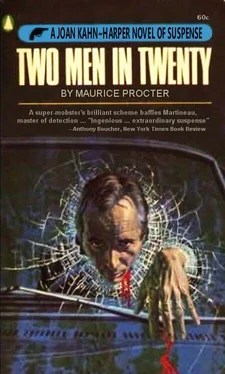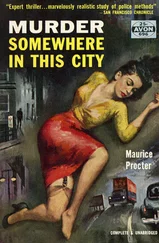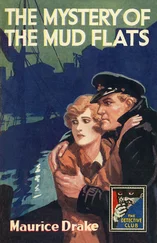Maurice Procter - Two men in twenty
Здесь есть возможность читать онлайн «Maurice Procter - Two men in twenty» весь текст электронной книги совершенно бесплатно (целиком полную версию без сокращений). В некоторых случаях можно слушать аудио, скачать через торрент в формате fb2 и присутствует краткое содержание. Год выпуска: 1963, Издательство: London : Hutchinson, Жанр: Полицейский детектив, на английском языке. Описание произведения, (предисловие) а так же отзывы посетителей доступны на портале библиотеки ЛибКат.
- Название:Two men in twenty
- Автор:
- Издательство:London : Hutchinson
- Жанр:
- Год:1963
- ISBN:нет данных
- Рейтинг книги:4 / 5. Голосов: 1
-
Избранное:Добавить в избранное
- Отзывы:
-
Ваша оценка:
- 80
- 1
- 2
- 3
- 4
- 5
Two men in twenty: краткое содержание, описание и аннотация
Предлагаем к чтению аннотацию, описание, краткое содержание или предисловие (зависит от того, что написал сам автор книги «Two men in twenty»). Если вы не нашли необходимую информацию о книге — напишите в комментариях, мы постараемся отыскать её.
Two men in twenty — читать онлайн бесплатно полную книгу (весь текст) целиком
Ниже представлен текст книги, разбитый по страницам. Система сохранения места последней прочитанной страницы, позволяет с удобством читать онлайн бесплатно книгу «Two men in twenty», без необходимости каждый раз заново искать на чём Вы остановились. Поставьте закладку, и сможете в любой момент перейти на страницу, на которой закончили чтение.
Интервал:
Закладка:
'Yes.'
'Right. We'll be ready for him. By the way, keep on pretending to follow up the inquiries about your bogus hit-and-run job. Ask anybody but Newby. We may be able to do something with that, when the time comes.'
'I'll do that,' Barden said.
There was a knock on the door, and Martineau called: 'Come in.' A tall young man in plain clothes appeared, carrying over his arm a sheaf of fairly large bills.
'Ah, another lot of posters,' said Martineau. Then he said: 'Detective Officer Ainslie, Mr. Barden of North Western Oxygen. You may have to work with him some time, Ainslie.'
'Yes, sir,' said Ainslie stolidly. He carefully lifted off the top poster and passed it to Martineau. The chief inspector spread it on the desk and looked at the twenty groups of photographs which were there, in five rows of four.
'Excellent,' he said. 'Better than the others, I think. Now you know where I want them all to go?'
'Yes, sir.' Ainslie nodded and departed.
'Do you know any of these fellows?' Martineau asked.
Barden looked. He looked carefully. 'No, never a one.'
'Twenty of the cleverest rogues in England,' said Martineau. 'I'm putting this up on the wall. I'll be seeing these faces in my sleep. I'm absolutely certain one or more of these fellows are walking about Granchester right now. Somebody should spot one of 'em. You never know your luck. I might clear these XXC jobs before I'm due to retire on pension.'
11
Sable of Granchester was the city's best furniture shop. It was also the most expensive, quality at a high price being the watchword of the firm. Sable's did practically no hire-purchase business. Wealthy and important customers paid for their goods by cheque, after a dignified interval. Other customers-prosperous retailers and the like, who did cash trade in their own business-often paid in full, on the spot.
Antiques were a valuable sideline to Sable's, and a part of their premises was set aside for this trade. People brought things there to be valued, and quite often sold them after valuation. For these purchases Sable's kept a large 'float' of ready money.
As anyone knows, antiques are not sold in large consignments. They come in single units or pairs or small sets, from all kinds of sources. Because of this, no passer-by was surprised to see some men delivering a grandfather clock to Sable's antiques department on a Saturday afternoon. Sable's was one of those shops which was closed on Saturday afternoons, and though the firm employed a watchman he did not arrive for duty until six o'clock at night. But nobody thought it odd that the clock should be delivered when the shop was closed. As the policeman on the beat pointed out later, in answer to criticism, the afternoon of early closing day was the time when most of the furniture stores took delivery of new goods.
When the watchman turned up for work, he found that the safe in the manager's office had been opened. There was an oxygen cylinder lying on the floor in the same room. When the police arrived they found that the premises had been entered through a small window at the back. There was no evidence to show that the front door of the antiques department had been opened to allow the passage of a grandfather clock. The door had two latch locks, two of those being considered safe from anything but a direct attack with a jemmy.
'They could have got the cylinder in the back way by sliding it through the window,' Martineau commented. 'Or their door-and-window man could have come through to the front and opened that door with two latch locks. But this was the middle of Saturday afternoon, with people about everywhere. Back or front, how the devil did they manage to get that cylinder in without being noticed?'
That question was not answered until the following Tuesday. In spite of intensive inquiries round about, nobody recalled the incident of the grandfather clock. The clock had been left standing in the antiques department, close to the wall near the foot of a wide flight of stairs. It was a place suitable for such an article, and its presence was accepted until Tuesday because the departmental manager had been taking a busman's holiday-Saturday afternoon, Sunday and Monday-nosing round after antiques in the less frequented parts of the Yorkshire dales.
A customer happened to look at the clock, and he thought that it was not quite up to Sable standards. He opened it, and saw that there was neither clock nor pendulum inside. In some amusement he pointed this out to a passing assistant, a man who had worked for Sable's twenty years without promotion.
The assistant also was amused, but secretly. To his experienced eye the clock was valueless as an antique, with or without works. Someone had blundered, and it was not he. He went to the antiques manager, his immediate senior, the man who sat in the place where he thought he ought to be sitting.
'That grandfather clock at the bottom of the stairs,' he said. 'It has no works.'
The manager was at his desk. He looked up sharply. 'What grandfather clock?' he demanded. 'As far as I know, we don't have a grandfather clock at the moment.' Then he attacked, instantly, being that sort of man. 'Did you buy it yesterday while I was up the dales?'
'I did not,' said the assistant, affronted. 'I thought you must have bought it Saturday morning while I was seeing to the packing of those chairs for London. The only thing I ever bought in your absence was that refectory table, and it was the best bargain we've had in years.'
'Oh, was it?' the manager retorted unpleasantly. 'All right, don't just stand there. Go and look after the shop. There might be a flock of customers in need of your valuable services.'
The assistant departed in a huff. The manager consulted his books. He had no record of any tall case clock which had not been marked off as sold and delivered. He left his desk and went to look at the clock which had no works, and as soon as he saw it he realized that no Sable employee, sober and in his right senses, would consider displaying such inferior cabinet work for sale. He wondered if some members of some other department were having fun at his expense.
Turning the matter over in his mind, he returned to his desk. Whatever happened, or whatever had happened, he could not see how he could be blamed, since the clock had not been in his department when he left on Saturday. But it was there now, and he was the manager. If there was going to be trouble, it would reflect on him. Who could have put the clock there? The only unauthorized people who had been in the shop were those men who-Ah! Everybody had been trying to guess how they got an oxygen cylinder into the place on Saturday afternoon. Ha ha! How simple! And how clever. And how clever of himself to realize why the clock was there. That ass Jenkins wouldn't have figured it out in a thousand years. No wonder he had never got on.
The antiques manager sat down at his desk and shot his cuffs. He picked up the telephone and told the girl on the switchboard that he wished to speak to Mr. Sable in person. He took a deep breath. Mr. Sable in person. This was quite a moment.
* * * * *
Half an hour later Martineau was inspecting the grandfather clock. With him was Sergeant Bird, his photo-and-fingerprint specialist. Also present was Mr. Sable, while the antiques manager hovered respectfully.
'Pictures first, before you dust it for prints,' Martineau said to Bird. 'I want lots of copies. We'll have pictures of it in all the papers. There's a chance that we might find the man who sold it to these crooks.'
He turned to Mr. Sable. 'Thank you for letting me know so promptly,' he said. 'This could turn out to be the best lead we've had so far.'
'Don't thank me, thank Mr. Lewis here,' Sable said. 'But for him, the thing might easily have been thrown out and broken up.' He smiled at the antiques manager, and that person actually blushed with pleasure.
Читать дальшеИнтервал:
Закладка:
Похожие книги на «Two men in twenty»
Представляем Вашему вниманию похожие книги на «Two men in twenty» списком для выбора. Мы отобрали схожую по названию и смыслу литературу в надежде предоставить читателям больше вариантов отыскать новые, интересные, ещё непрочитанные произведения.
Обсуждение, отзывы о книге «Two men in twenty» и просто собственные мнения читателей. Оставьте ваши комментарии, напишите, что Вы думаете о произведении, его смысле или главных героях. Укажите что конкретно понравилось, а что нет, и почему Вы так считаете.












